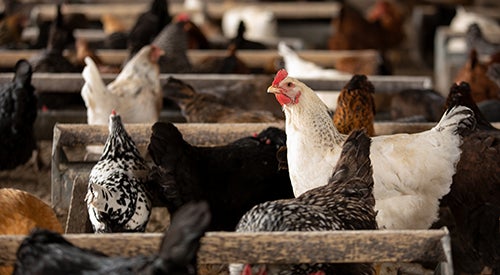Many consumers believe that the USDA Organic label on food packaging means that the animals involved in that item’s production were raised in higher-welfare systems, but under the USDA’s current standards, that is not always the case. Learn more at aspca.org/organic.
The pending new Organic Livestock and Poultry Standards (OLPS) rule would enact stronger requirements to ensure animals raised under the “USDA Organic” banner are guaranteed better living conditions that align with consumer expectations. Furthermore, the OLPS rule would reward organic farmers who already engage in higher-welfare practices, like providing chickens with proper outdoor living space where they can engage in natural behaviors.
Animal advocates, responsible organic farmers and consumers have been pushing for stronger animal welfare standards in the USDA Organic program for more than a decade. Each year, more than 186 million animals are raised under this program, which currently lacks the requirements needed to ensure that animals have meaningful outdoor access, the ability to carry out natural behaviors, and protection against painful and unnecessary mutilations.
Until the USDA implements the OLPS rule, large multinational corporations will continue to take advantage of loopholes in existing organic regulations. These loopholes enable companies to deceptively label cruel, factory-farmed products “organic” so consumers with good intentions will purchase them.
The OLPS rule would reestablish the meaning of “organic” by requiring famers with “USDA Organic” certification to improve the quality of life for animals in their care.
